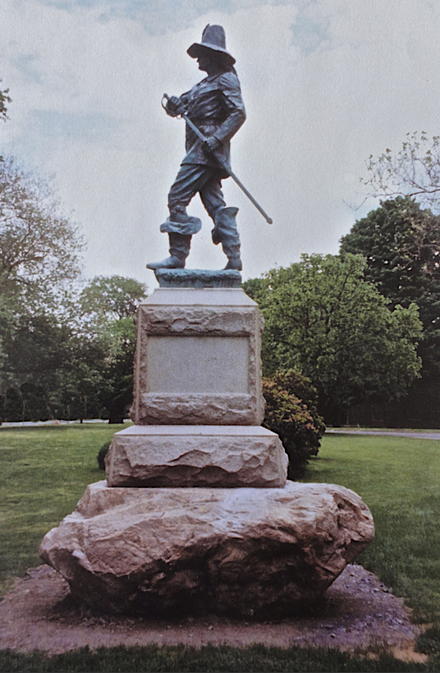Connecticut Republican gubernatorial candidate Bob Stefanowski’s objective of eliminating the state income tax is ridiculous but not for the reason commonly offered -- that the tax produces half state government’s revenue and cutting spending that much never would be practical, not even over the eight years of Stefanowski’s "plan."
Instead Stefanowski’s "plan" is ridiculous because the Democrats probably will retain the state House of Representatives in the coming election and well might recover a clear majority in the Senate, now tied at 18. Any budget will require the General Assembly’s approval and no house controlled by Democrats will ever agree to even modest spending cuts.
A Democratic majority in just one house would let Stefanowski off the hook -- along with Republican legislators, who may be glad if they stay in the minority and thus avoid responsibility for closing next year’s projected state budget deficit of more than $4 billion.
Statue of Captain John Mason in Windsor, Conn. Below, the plaque with it.
— Photo by MoonWaterMan
Students from Central Connecticut State University visited a park in Windsor the other day to contemplate the statue of a hometown hero of sorts, Captain John Mason, a founder of the Connecticut colony and leader of what might be called the European tribe in the Pequot War in 1637. Mason was in command when most of the Pequots, including women and children, were slaughtered by gunshot and fire in their fort in Groton, a genocide celebrated then but not so much now.
Two decades ago Mason’s statue was moved from Groton to Windsor to end celebration of the massacre and diminish its memory.
How far political revisionism should go with monuments is always a fair question. Leaders of the late Southern Confederacy are increasingly out of favor, but even George Washington owned slaves and fought in a war against Indian tribes. For the time being, Washington’s sins remain forgiven, overtaken by his immense service to his country.
So what is to be done with Mason? Whether his statue stays or goes somewhere else, like a museum, it is important to put him in the context of his time. Standards were primitive four centuries ago -- not just for the European colonists, who generally regarded the aboriginals as savages, but also for the Indians. Everyone was tribal.
Indeed, Europeans living in Massachusetts were actually invited to settle in Connecticut because of Indian tribal rivalry and war here. The Pequots, whose name meant "destroyers," were not native to the area, having come from what is now upstate New York, and they preyed on less combative tribes who imagined the Europeans as allies. Such an alliance between the Europeans and the Mohegan tribe indeed exterminated the Pequots. While today the two tribes, reconstituted, are partners in the casino business, back then they were as cutthroat to each other as the Europeans and the Pequots were to each other.
Connecticut has plenty of history to celebrate and less to regret than some states. But Mason would not have a statue except for the massacre of the Pequots. The statue’s placement in the park in Windsor implies that he is still officially regarded as a hero. Since Mason is buried in a cemetery in Norwich, a city he helped found, his statue might better be moved to his grave, where people could regard it without any official suggestion of heroism.
Chris Powell is a columnist for the Journal Inquirer in Manchester, Conn.











